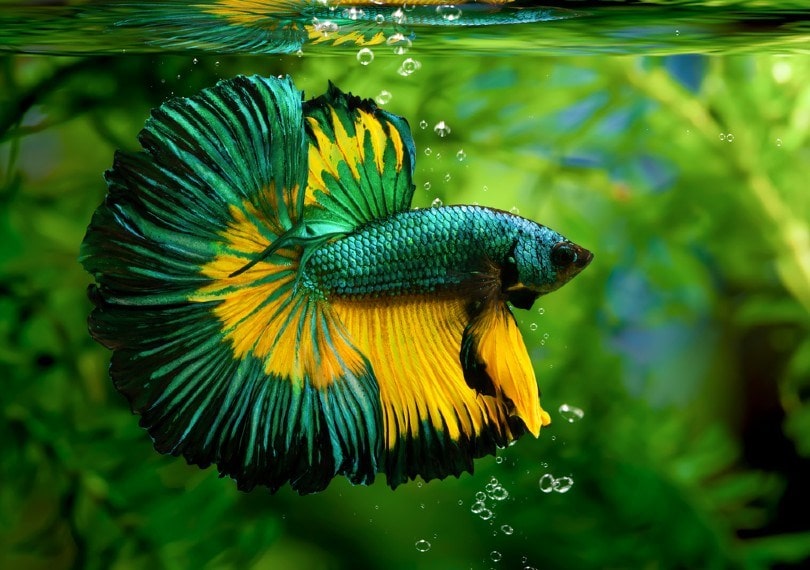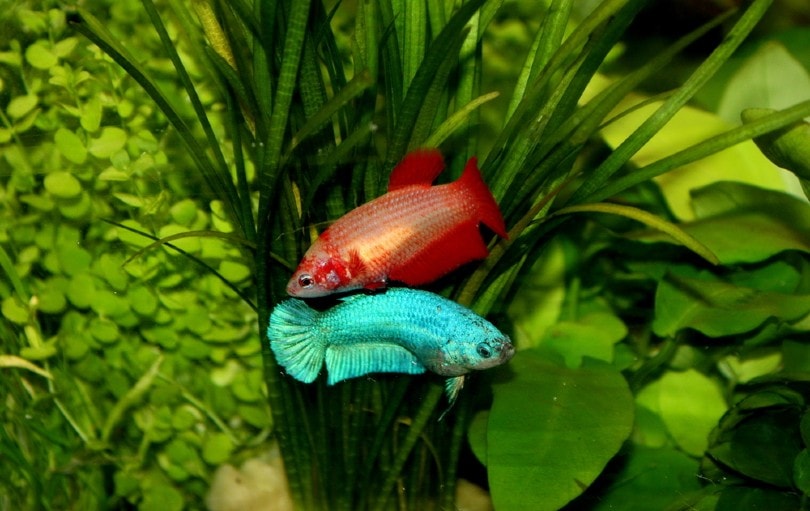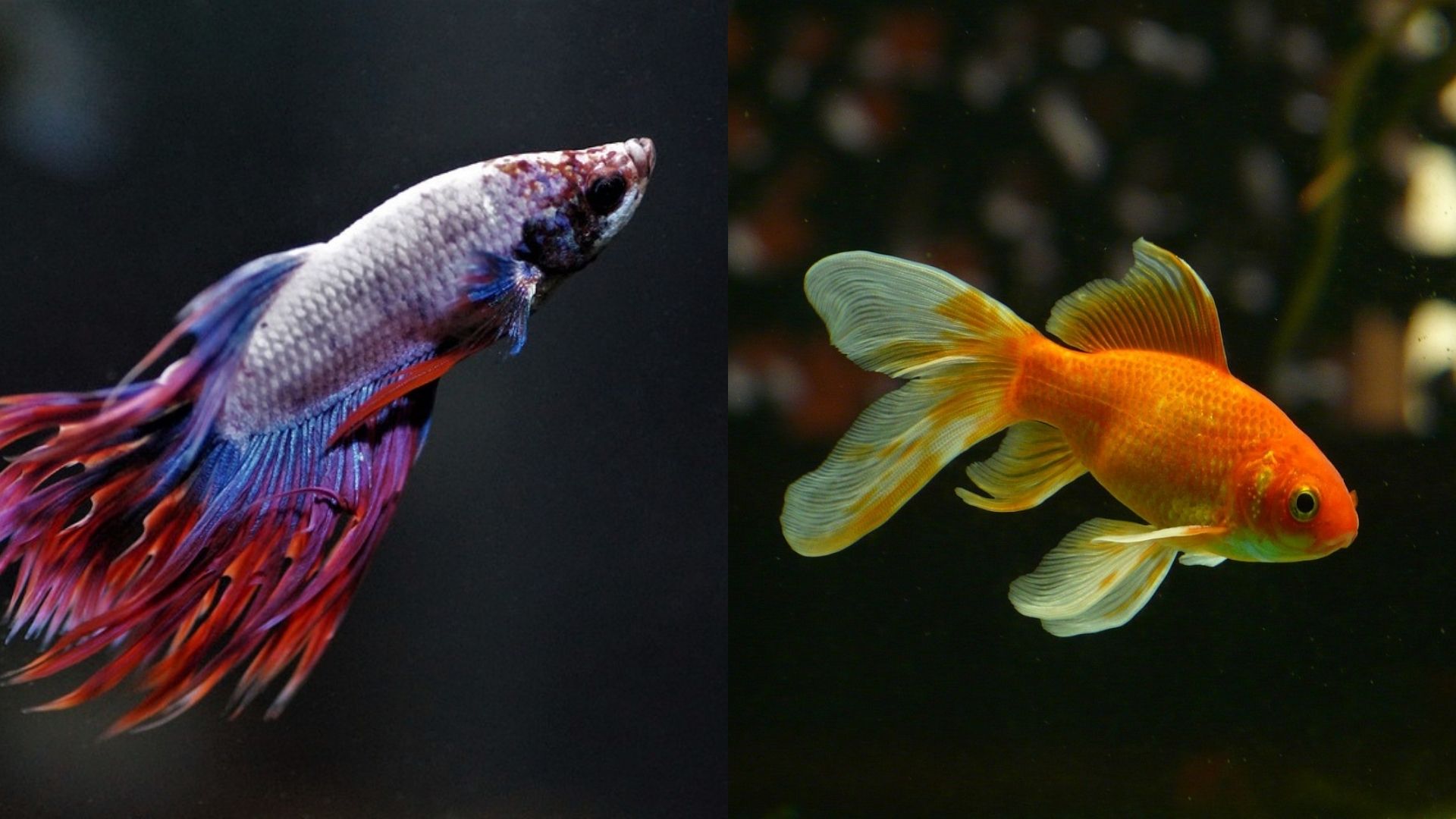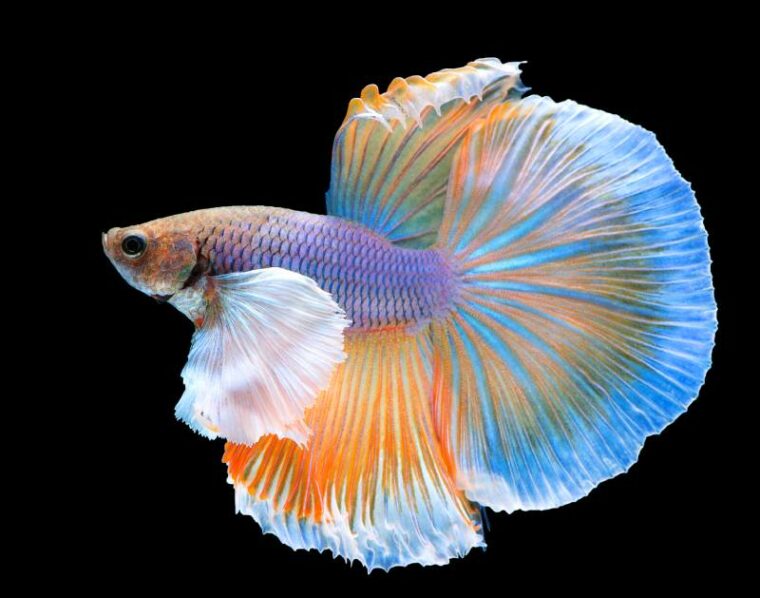
Click to Skip Ahead
As we’ve all been taught, everybody must poop! This is just as true for fish as it is for the rest of us. Dogs need to go for a walk and have their poop picked up, and cats get regular litter box cleanings to keep track of their pooping, but how does a betta owner know if their betta is pooping?
Fish have a lot of the same care needs and health complications as the rest of us. It’s just that their size and living situation can leave us unsure of how to assess and treat their health concerns. This is even true for a lot of veterinarians! Luckily, we’re here to help with everything you need to know about identifying and treating constipation in your betta.
What Is Betta Fish Constipation?
Constipation is passing less stool than normal. This can be a complete lack of passing stool or simply moving along more slowly than usual.
In bettas, they’re usually slow to pass stool rather than failing entirely, but it can present either way.
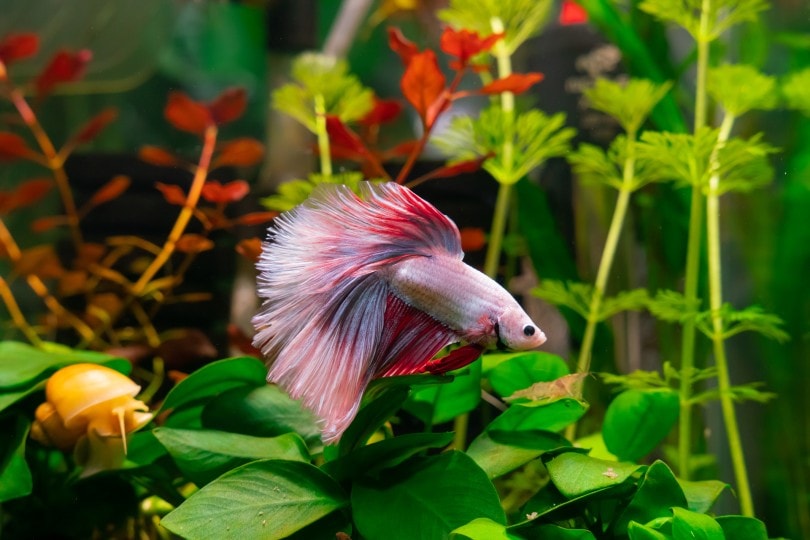
What Are the Signs of Constipation in Betta Fish?
Normal betta fish poop is a brown to dark brown color and sinks to the bottom of the tank as soon as they pass it. If the poop is the right consistency, it will break off in small chunks as it leaves the betta’s body.
How frequently bettas poop depends a lot on what they’re eating and how often. Normal feeding schedules can vary from once to twice a day, not counting treats; therefore, how frequently they need to poop can also vary. They’ll poop many times in one day, in small amounts at a time, and you will often not notice at all.
A common early warning sign of constipation, therefore, though counterintuitively, is noticing your betta’s poop. If they are passing light-colored, thin or stringy, trailing poops, this is a sign of over-firm stool and constipation.
Bettas constipated long enough to feel ill may refuse food or pick it up only to spit it out, swim lethargically, and lack a bright personality.
In severe cases, you may notice swelling of the betta’s belly from accumulated stool internally. Pressure from swellings inside can interfere with their swim bladder, which may cause them to have trouble diving or rising in the tank, swimming only at the top or bottom, or they may be flipped over entirely.
Dropsy Versus Constipation
Dropsy is the term for fluid accumulation in the coelomic cavity of a fish (think abdominal cavity). This fluid accumulation can cause significant swelling of a betta’s belly, causing the scales in the area to push outward, commonly referred to as a pinecone appearance. A betta with dropsy will likely be lethargic, refuse food, and develop secondary illnesses.
As you might have caught, the signs of dropsy and constipation can be very similar, but dropsy requires special treatment, so it’s important to know which you’re dealing with.
The important difference between the two is that coelomic cavity swelling isn’t actually common in constipated bettas, and if it is occurring, it shouldn’t be severe. Due to this, you won’t see the betta’s scales sticking out sideways. Dropsy, on the other hand, will cause rapid, significant swelling, and that pinecone appearance, if present, helps you know which problem your betta has.
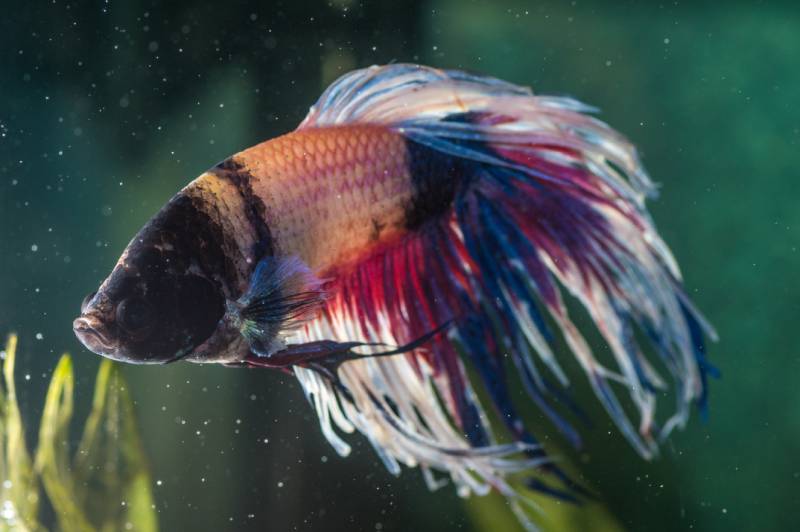
What Are the 4 Causes of Constipation in Betta Fish?
The single most common cause of constipation in betta fish is their diet. This can set them up for failure in several ways.
1. Meal Volume
Overfeeding fish is an incredibly common problem, especially for those new to the fishkeeping hobby. You should only feed your betta as much food as they can finish in about two minutes, no more. If they have any food left after about two minutes, it is best to remove that food from the tank. Large meals can strain their GI tract and lead to difficulty passing stool from those meals.

2. Meal Composition
Betta fish are carnivores, though it isn’t uncommon for them to get a little plant matter mixed into their diet in an aquarium setting. If your betta is being fed exclusively fish flakes instead of betta pellets, they cannot digest this appropriately with their shorter herbivorous GI tract and will be prone to episodes of constipation.
Speaking of pellets, any dry food that a betta eats immediately upon entering the tank will continue to hydrate and swell after they swallow it, tricking them into overeating essentially, as far as space inside their GI tract is concerned. Soaking a betta’s dry food first and being strict about meal sizes can help with this.
Feeding live betta-appropriate foods, like brine shrimp, blood worms, and daphnia, will fit well as an option for a betta diet and can be a good source of fiber, too, keeping your betta pooping on a regular schedule. Many home fish owners don’t keep live diet options, but when keeping a betta, it is important to incorporate this at least sometimes.
3. Tank Size
Bettas are one of the popular freshwater fish that are most likely to suffer from constipation. Part of this is their carnivorous needs often not being met, but their tank size is another culprit. Somewhere along the way, it became common to keep bettas in tiny tanks of one gallon or sometimes even less. Many of these don’t have a filtration system at all, like fish bowls, but even if significant care is taken to maintain the tank’s water parameters, bettas also just need some space to swim and exercise for good GI health. The minimum tank size for a betta should be about 10 gallons.
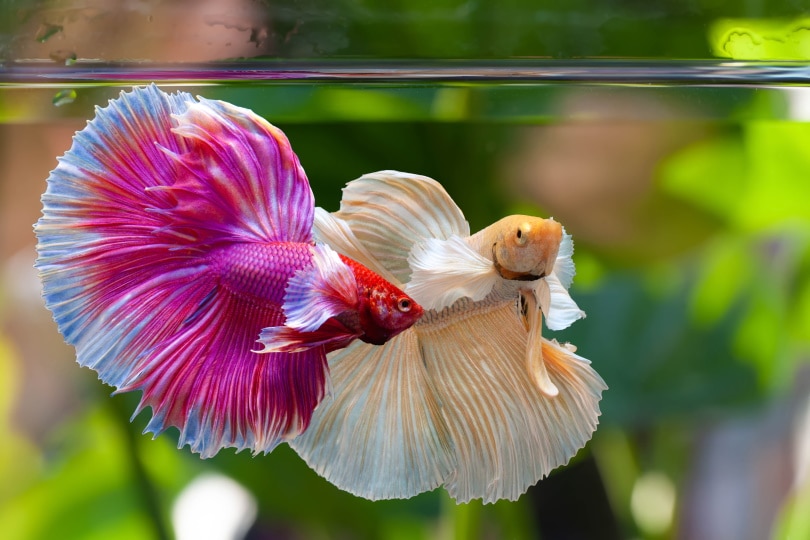
4. Concurrent Illness
Tumors obstructing intestinal movement, inflammation or other abnormalities like dropsy or swim bladder disease, GI foreign body obstructions and more, anything that creates an abnormal environment in the coelomic cavity or gets in the way of a betta’s normal GI tract path and movement, can cause constipation.
How Do I Care for a Betta Fish That Is Constipated?
For a betta that is already constipated, you want to support good bowel movements by making adjustments to their diet to fit their needs as above going forward.
As soon as you suspect your betta is constipated, you’ll also want to increase their fiber intake to help their digestion. The commonly suggested way to do this is to feed them a half to whole pea. The pea needs to be blanched, cooled and peeled before feeding. Some bettas may not want to eat a pea, so freeze-dried daphnia pre-soaked for about ten minutes can also work, just a few total for the day.
Bettas that have been constipated for a while may need some help moving along what’s already stuck. Adding salt to their tank water can help provide extra electrolytes to ease the burden on their kidneys and potentially relax their muscles.
Epsom salts are commonly recommended online but there’s no evidence that this works better than normal sodium chloride salt, so I usually recommend just sodium chloride salt, 1 tbsp per 5 gallons of tank water. If your betta lives with live plants, other fish, or in a large tank, you’ll want to remove them to a small quarantine tank to add the salt since it can affect plants and other fish and it may not be economical to treat their normal tank size. They’ll live in their salt bath for about one week.

Do Betta Fish Recover From Constipation?
Yes, they usually do, though this depends on the cause. Husbandry issues corrected early have a great prognosis, but constipation due to internal tumors or other illnesses may not respond to treatment. Not treating constipation can quickly become fatal, so be sure to check in on how your betta is behaving daily.
Frequently Asked Questions (FAQs)
Should I withhold food from a constipated betta fish?
This is commonly recommended, and doing so isn’t the worst idea, but not adding new food to the GI tract may not help with moving along what’s already stuck, and having energy from eating may be more important for that. Instead of withholding food for a day entirely, a better plan is significantly reducing the size of meals or bringing two meals a day down to one for a couple of days, with an emphasis on feeding high-fiber options when feeding.

Do I add aquarium salt before or after a water change?
You’ll need to add the salt after a water change, as the water change process will dilute your salt if you salt first.
Conclusion
Betta fish failing to eat their food, becoming lethargic, and with no poop or long strings of firm poop are potentially constipated. A review of their diet and some supportive steps like increasing their fiber intake and giving them a salt water bath can solve this problem. When in doubt, check your water parameters, too, and reach out to a local aquatic vet if you need help.
Featured Image Credit: Digital Art Studio TH, Shutterstock



